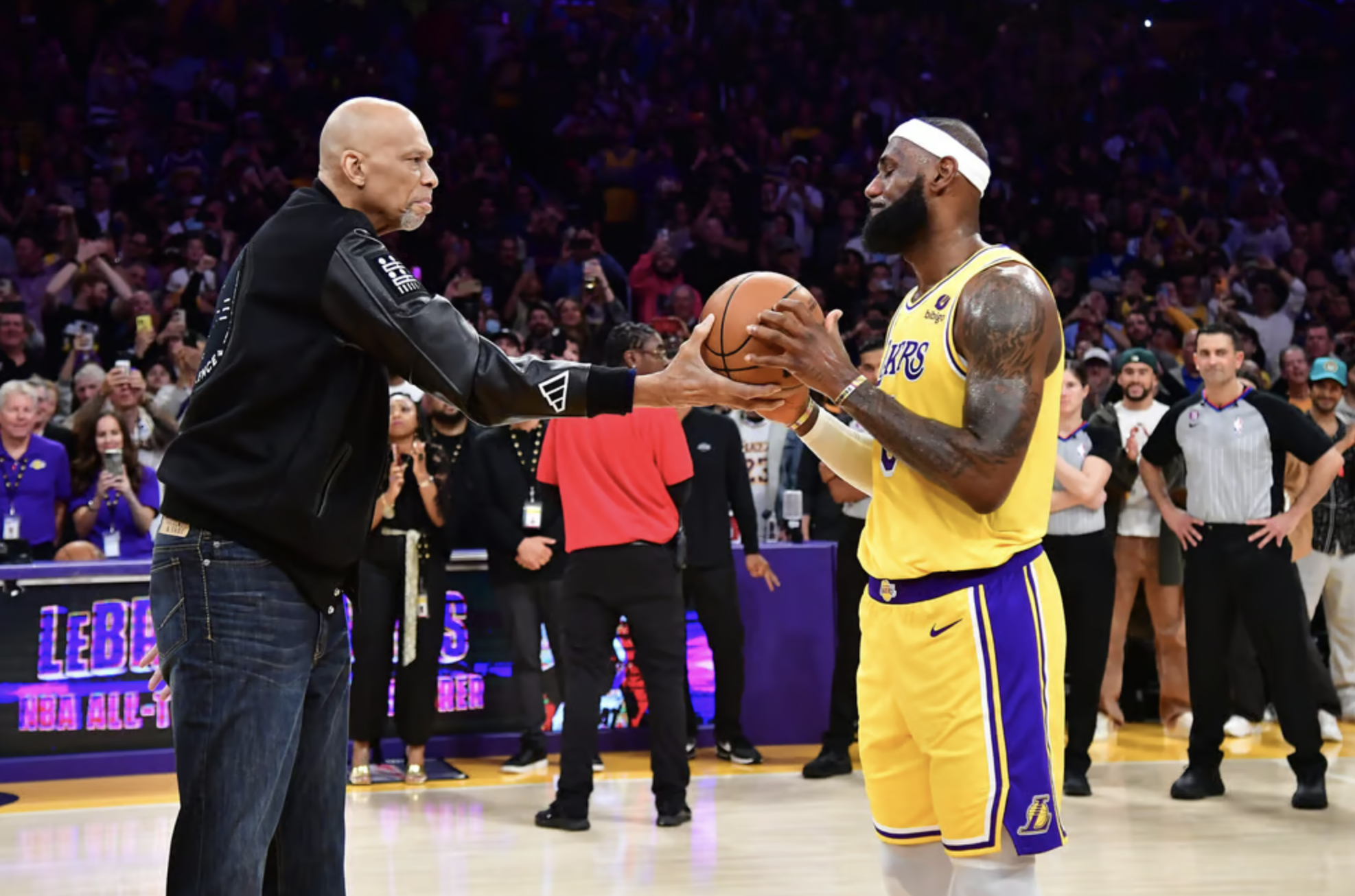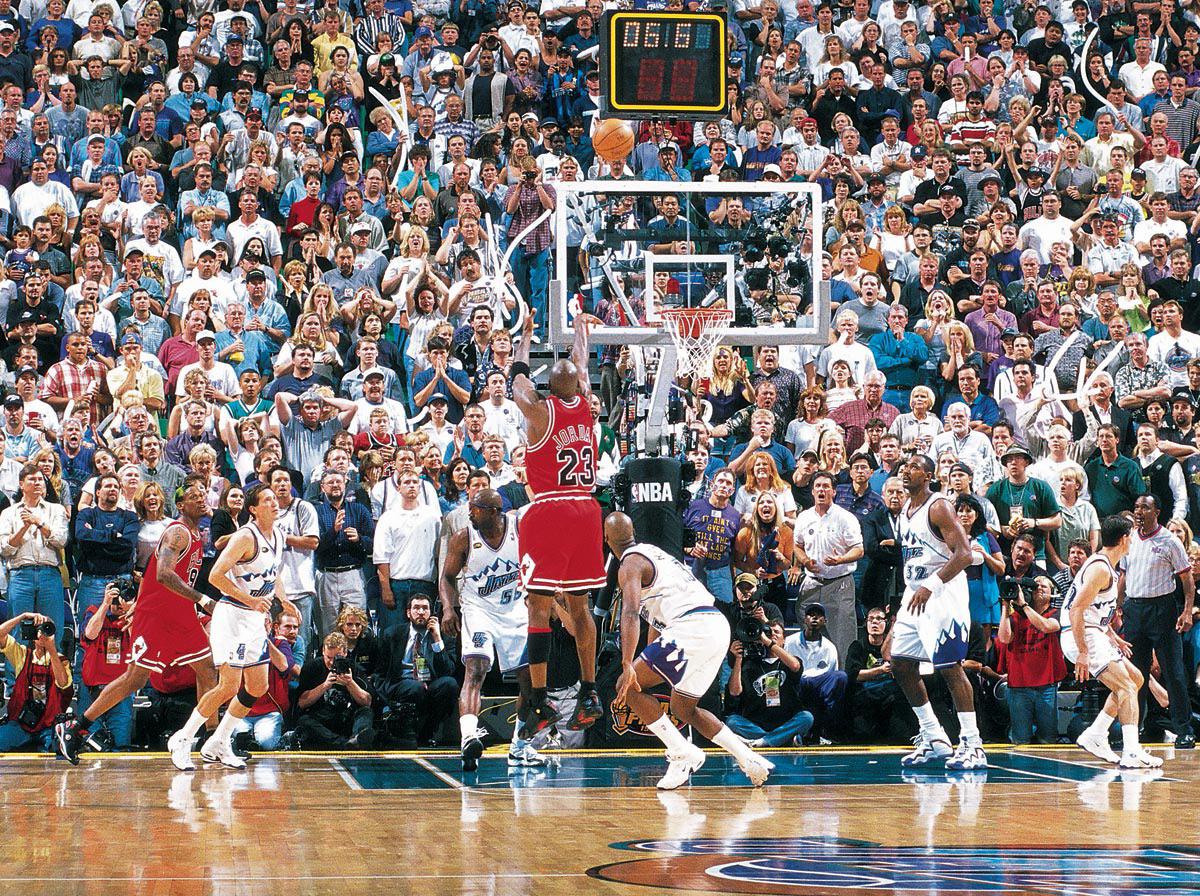The LeBron James Shot That Nobody Saw Because They Were on Their Phones
Being focused, being in the moment, not only applies to work but it applies to life. I’ve found that I’m happier when I give my full attention to the people in the room rather than the people on my phone.
Being completely focused on a single task without any distractions is the best feeling in the world. It’s a challenge for me to arrive at this state but, after years of practice, I’ve found a formula that works for me.
I dip into my finite bank of willpower, pull out one token, and hand it to my Brain Cell General. In exchange, he rallies the troops to focus. He stands on the frontal lobe hill and gives a passionate speech about focusing that is filled with quotes from Deep Work by Cal Newport. Half of my brain cells turn around and gather around him. The other half are entirely focused on frivolous thoughts: A Marlins three-team-trade scenario, the fear of being rejected, and the constant reminder to run the dishwasher later that night (something that I do every night and if I didn't, would hold no real consequences). The General slowly convinces the laggard brain cells to join and they do in staggered waves. By the end of the speech, most of my brain cells are listening. The General ends his speech by saying, "… and if we want Daniel to live up to the delusion of greatness we've created for him - we must let him FOCUS!" They all give a "Oo-rah!" with their fists in the air. The General deploys his troops to different parts of the battlefield that is my nervous system.
The 6th Audio Battalion ensures my ear drums convert all conversation, music, and coffee shop cacophony into a single muffled sound.
The 33rd Vision Platoon powers down my peripheral vision. The walls of the coffee shop are no longer visible to me and I enter into a shadow cube of productivity. I get tunnel vision and can only see a square with an area of 100 pixels around the blinking text cursor on my computer screen. The Platoon turns on my third eye and with it, I see a wooden table next to me. On this table, I place pages of old conversations, clips of articles and books, journals of previous thoughts, and even a blank page for scratch.
I’m in the zone.
If I were to get distracted, even for a few seconds, my metaphysical table will catch fire. I have to get back in the zone quickly to put it out; if I don’t, it will all become a scorched memory. I can recreate the contents of the table but, it will cost me another token of willpower.
Entering the zone is not as difficult as staying in the zone. To accomplish this, the General leaves the last and most important task for himself.
He drives the electric express train down from my brain, through my trapezius muscles, and gets off at my right shoulder. He grabs the controls and moves my right arm toward my phone. The General knows what happens next but it still surprises him. A rebel army rushes towards him. They yell a version of the same thing and it always makes him chuckle. “That girl from high school. Yes… the one you crushed on really hard. Yes… we need to know what she’s up to at this very moment! We demand you get on her Instagram account right now!” Their desperate plea used to convince The General but, after months of constant losses, the rebellion has lost most of its power (although, they do cling on to the occasional victory). The General shuts down my phone and the rebel army slumps and joins the focus revolution.
The first battle of the Attention War is won.
Constant distractions have been an unintended consequence of the Information Age. I grew up during the fastest acceleration of accessibility to information in the history of the world. Apple released the first iPhone when I was in high school. By the time I was in college, Wi-Fi and fast internet were ubiquitous. Today, more than half the world owns a smartphone and could find Christian Yelich's batting average in 2017 in a few seconds (it was .282).
I fell prey to the availability of information. I felt like I needed to know everything as soon as it was happening. I would do homework on the left 2/3 of my computer screen and the right 1/3 would be my Twitter feed, updating every second. However, this wasn’t enough for me. I would also have NBA League Pass playing on my TV. I’m shocked I got anything done in that environment.
I can’t recall exactly how it happened but I came across a book review of Cal Newport’s Deep Work. I’ve always been interested in improving my productivity and the book piqued my interest. I read it and was convinced this was a lifestyle for me.
At work, there was a proposal to start a group chat. I said I don't want to be a part of it. I was swindled into believing that it would be just to share our phone numbers — I should have known better. The thread quickly became what all group chats become, one important message in an ocean of insignificance. I like how 37 Signals puts it, “Group chat is like being in an all-day meeting, with random participants, and no agenda.”
I turned off my phone for the next six weeks (with one caveat, I could still take phone calls on my Apple Watch). Thus began my digital detox.
There wasn’t a big ah-ha moment for me. My phone didn’t have notifications on besides phone calls but, my phone calls are screened. If you are a known contact, my phone will grant you my attention. If you are not, you go through an elaborate exercise to prove you are human and have business with Daniel. I also got off of social media years ago (another can of worms for another time).
This exercise only confirmed what I already believed, which is that there is a correlation between happiness and less screen time. Work colleagues didn't notice or didn't care that I wasn't on the group chat (they could tell me in person what was important). After a week or two, I was slightly happier, more bored, and a lot less stressed out.
After the six weeks were up, I had a decision to make. The minimalist in me was fighting against the digital minimalist in me. Not having an iPhone is impractical in many ways. Having a digital calendar is more convenient than carrying a planner (remembering isn’t an option for me). Taking quick notes would require me to haul a journal and pen everywhere. Directions. My goodness. What a pleasant feature of the modern age. I could have Siri tell me when and where to turn while I mull over more important things, like a four-team trade that brings Miguel Cabrera back to the Marlins.
The tipping point for me was Costco.
My phone case doubles as a wallet that holds three cards: my Amex card, ID, and transit pass. At Costco, you need your Costco ID and a Visa card; they don’t accept Mastercard or American Express. I imagine Costco stormed out of the meeting when they realized the 0.0001% increase in credit card fees would force them to raise the price of their jumbo hot dog and soda combo from $1.50 to $1.51. This blasphemy was worth annoying their millions of members who use non-Visa cards.
My desire to not add a leather wallet to my repertoire was the dealbreaker for me. I have digital versions of my Visa debit card and Costco membership card on my iPhone.
Just because I have a phone doesn’t mean that I’m on it all the time. My digital detox broke my habit of constantly picking up my phone for no good reason. I oftentimes forget to check my phone for hours. I text in bunches a couple of times a day. My friends don’t seem to hate me for it.
I often feel like the only sober guy at the party. I look around a room and I’m the only one not on my phone. It happens so frequently that it’s like seeing aliens while aboard a Star Wars ship, it’s odd (and a little terrifying). It’s such a normal part of life, but there are times it stands out to me.
One day, I arrived at class at ASU and the room was locked. As students arrived and discovered we were locked out, they would wait two seconds then immediately get on their phones, put their backs to the wall, and slowly slide down to the floor - without ever taking their eyes off their screens. One student after another did this until 25 students sat in the hallway. I looked around, bored, and it struck me how weird this was. That used to be me. I struck up an unremarkable conversation with the professor and passed the time. I was present even if the moment was a boring one.
Another time, I was at the Marquee Theater in Tempe to see Mayday Parade, an emo favorite of mine. Boys Like Girls performed after them and the lead singer stopped midway through their first song. His face was red and his pants were tight as he walked and yelled from one side of the stage to the other. "This is not how this shit used to be!" he yelled. "Put your fucking phones down. I don't want to see none of this ticky-tocky shit!" It's not often that the performer you've come to see yells at you. By the end of his rant, half of the crowd put their phones in their pockets and enjoyed the rest of the show. I may have stuck out my chest ever so slightly.
Observing distracted students and concertgoers was more or less benign. The following moment changed me.
I was at home watching LeBron James pass Kareem Abdul-Jabbar to become the all-time points leader. This was a big deal for me. I'm a lifelong hooper and fan of the game. This record will not be broken again in my life - if ever. When LeBron was only a few buckets away from breaking the record, I woke my girlfriend up. She couldn't care less about sports, records, or staying up late on a school night but, it was too important for her to miss (she disagrees but she’s wrong). We watched LeBron get the ball on the elbow; he backed down his defender with a few dribbles and then took his patented step-back fade-away jumper and nailed it. I've seen him hit that shot a thousand times before.

Kareem handed LeBron the ball while slightly bowing, a show of respect for the new king in points. I was moved by that, and so was LeBron, who was nervous and in tears the whole ceremony. I went to bed happy I got to see some history and see LeBron’s crowning achievement after a lifetime of growing up with him on my TV.
The next day I woke up and saw the image of LeBron’s record-breaking shot — I was horrified.

Everybody was on their phones while LeBron James broke the record, including his two sons in the front row. Considering that the new smartphones have three camera lenses, it’s safe to say that there were more cameras than eyeballs that captured this moment. I’ve watched people let their food get cold as they tinker with filters and edits to the photo they took of brunch. A friend of mine climbed the side of a precarious cliff, teetering between life and death, just to get the best shot for her IG. People ignore their living grandparents just to see what a stranger is saying on Twitter. I’ve been too close to it all to realize the severity of the problem. Nobody is paying attention.
What does it mean to break a record? It takes the accumulation of a remarkable career. It’s pushing the game and the human body, spirit, and ambition to the next level. It’s a time to reflect, honor, and celebrate. To take a picture and immediately share it on the internet is to share status. It’s to say, I was there when LeBron broke the record, look. Nobody took the time to appreciate greatness. It makes me sad.
I will remember this picture not for LeBron’s legacy but as a portrait of peak distraction.
I've seen this image juxtaposed against Michael Jordan's famous game-winning shot versus Utah. Which, as an aside, is fantastic because LeBron has been compared to Jordan for his entire career (Jordan, more than likely, would have broken the points record if he didn't retire to play baseball). Everybody is paying attention.

People were not more zen in 1998. If I gave everybody an iPhone and Instagram before the game, those people would be on their phones too. But, lucky for them, they didn’t have the sophisticated distraction tools that we have today.
Being focused, being in the moment, not only applies to work but it applies to life. I’ve found that I’m happier when I give my full attention to the people in the room rather than the people on my phone. I’m not the only one. I’m encouraged by these group of high school students that purposely hang out with each other without a phone. Something so simple is radical when the times are so extreme. Like Winston hiding from the telescreen to write in a journal in George Orwell’s 1984. I hate to sound like an old person but looking up at the world is better than looking down at your phones. If you don’t believe me, try it for six weeks and get back to me.
Milkman Model Newsletter
Join the newsletter to receive the latest updates in your inbox.
